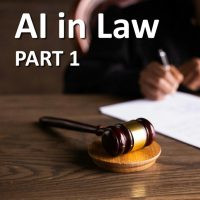
If you’ve been hearing about Artificial Intelligence (AI) and feeling equal parts curious and uneasy, you’re not alone. From CLE panels to cyber-insurance questionnaires, “AI” seems to be everywhere—but what does it really mean for a law firm like yours? Let’s take a calm, plain-English look at what’s happening, why it matters, and how you can stay confidently in control.
Let’s Start with What AI Really Is
AI simply means software that can learn, recognize patterns, and make small decisions on its own. You already use it every day—when your email filters spam, your phone predicts your next word, or your document system suggests a folder name.
The difference now is speed and accessibility. What used to live in research labs is now built right into the tools lawyers already use: Microsoft 365, Clio, NetDocuments, and even your cyber-insurance dashboards.
So no, you didn’t miss a secret seminar. AI has just quietly moved from the edges of technology into the center of daily professional life.
Why Lawyers Are Paying Attention
Lawyers sit at the crossroads of confidentiality, compliance, and client trust. That means every new tool brings a fair question:
“Can I use this safely without risking my license or my reputation?”
It’s a smart question—and exactly the right one.
AI can analyze, summarize, or draft faster than ever, but it can’t carry ethical responsibility. That still belongs to you. The opportunity is to delegate the drudgery, not the duty.
When used well, AI can:
- Save hours on repetitive admin tasks.
- Improve document accuracy.
- Strengthen cybersecurity with real-time monitoring.
- Free your attention for strategy and client care.
That’s not about replacing judgment—it’s about protecting it.
How We Got Here (Briefly, and in Plain English)
AI isn’t new—it’s been around since the 1950s—but recent advances changed the game. The breakthrough came when computers learned to understand language contextually instead of literally. That’s what allows today’s systems—like ChatGPT—to hold natural conversations, summarize complex information, and draft readable text.
Now, a new generation of “agentic” systems is emerging: tools that don’t just answer questions, but take small, safe actions on your behalf (like flagging a compliance risk or organizing files). We’ll explore that next in Part 2: AI Agents vs. Agentic AI—What’s the Difference.
What This Means for Your Firm Right Now
AI isn’t a wave to fear—it’s a tide to understand. You don’t need to be the first to adopt every tool. You just need to:
- Know what AI is (and isn’t).
- Stay alert to where it shows up in your workflows.
- Choose secure, compliant partners who understand the legal environment.
The truth is simple: the safest firms will be the best informed.
The Bottom Line
You’ve already mastered every other tech shift—from email to e-filing to encrypted communications. AI is just the next one.
Handled thoughtfully, it will become your calmest, most consistent helper: The one who organizes, watches, and reminds—so you can focus on what no machine can replace: your clients, your craft, and your reputation.
Let’s Make AI Work for You, Not on You
If you’d like a simple, law-firm-specific conversation about where AI fits safely in your operations, we’re here to help. Our Siouxland legal IT team builds secure, compliant systems that give you the benefits of modern technology—without the risks.
Let’s start with a calm, confident plan for your firm’s AI journey.


